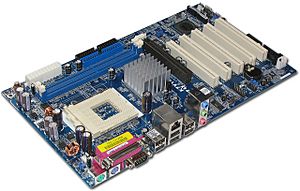Computer engineering facts for kids
Computer engineering is a special field that mixes parts of electrical engineering and computer science. It's all about making and improving both computer hardware (the physical parts) and software (the programs).
Computer engineers learn about electronic engineering, how to design software, and how hardware and software work together. They don't just focus on one or the other. These engineers work on many parts of computers. This includes designing tiny microcontrollers, powerful supercomputers, and even the circuit design inside them. They look at how computer systems work and how they fit into bigger projects.
Computer engineers often write programs for small embedded computers. They also design special chips called VLSI chips. They might create analog sensors or design circuit boards. Designing operating systems like Windows or macOS is another task. Computer engineers are also important in robotics. Robots use digital systems to control things like motors and sensors.
Many universities let computer engineering students choose specific areas to study more deeply. This is because there's so much to learn about computers! Some schools ask students to study general engineering first.
Contents
- History of Computer Engineering
- What Computer Engineers Do
- Specialty Areas in Computer Engineering
- Coding and Information Protection
- Communications and Wireless Networks
- Compilers and Operating Systems
- Computational Science and Engineering
- Computer Networks and Mobile Computing
- Computer Systems: Architecture and Performance
- Computer Vision and Robotics
- Embedded Systems
- Integrated Circuits and VLSI Design
- Signal, Image, and Speech Processing
- Education for Computer Engineers
- Similar Jobs and Fields
- Images for kids
- See also
History of Computer Engineering
The first computer engineering degree in the United States started in 1972. It was at Case Western Reserve University in Cleveland, Ohio. By 2015, there were 238 approved computer engineering programs in the US.
In Europe, different groups approve computer engineering schools. More and more jobs need engineers who can design hardware, software, and manage computer systems. Because of this, many colleges around the world now offer a bachelor's degree in computer engineering. Both computer engineering and electronic engineering programs teach about designing circuits. Like most engineering jobs, computer engineers need to be good at mathematics and science.
What Computer Engineers Do
There are two main types of computer engineers: hardware and software engineers.
Computer Hardware Engineers
Most computer hardware engineers research, develop, and test computer equipment. This includes things like circuit boards, microprocessors, and internet routers. Some also update old computer equipment to work better with new software.
Most hardware engineers work in research labs or high-tech factories. Some work for the government. They usually work full-time. In 2012, the average pay for a computer hardware engineer in the USA was about $100,920 per year.
Computer Software Engineers
Computer software engineers create, design, and test software. They build and maintain computer programs. They also set up networks like "intranets" for companies. Software engineers can design new apps for businesses or individuals. Some work for themselves and sell their software.
Specialty Areas in Computer Engineering
Computer engineering has many different areas you can focus on.
Coding and Information Protection
Computer engineers in this area create new ways to protect information. This includes digital images, music, and other files. They work to stop copying without permission or other kinds of tampering. They might work on wireless communication or digital watermarking.
Communications and Wireless Networks
Engineers here improve telecommunications systems and networks, especially wireless ones. They work on making networks faster and more reliable. This includes designing high-speed networks and systems that can handle errors.
Compilers and Operating Systems
This area focuses on designing and building compilers and operating systems. Compilers turn code into programs computers can understand. Operating systems are the main programs that run your computer. Engineers here create new ways for these systems to work.
Computational Science and Engineering
This is a newer field. People in this area use computer methods to solve complex math problems. These problems can be in engineering, science, or even social studies. Examples include designing airplanes or VLSI circuits.
Computer Networks and Mobile Computing
Engineers in this area build systems that combine computing, communication, and information access. They work on things like wireless networks and making mobile systems work better. They also improve how fast and reliable computer networks are.
Computer Systems: Architecture and Performance
Engineers in computer systems work on making computers reliable, secure, and fast. They design processors that can do many tasks at once. They also create new tools and ideas to make computer systems perform better.
Computer Vision and Robotics
In this area, computer engineers develop visual sensing technology. This helps computers "see" and understand their surroundings. They use this information to do many tasks. This includes improving human modeling, image communication, and how people interact with computers. They also design special cameras.
Embedded Systems
People in this area design technology to make systems faster and more reliable. Embedded systems are small computers built into other devices. They are found in many things, from a small FM radio to the space shuttle. They are used in automated vehicles and robots.
Integrated Circuits and VLSI Design
This area needs good knowledge of electronics. Engineers here work to make the next generation of VLSI circuits faster and more energy-efficient. These are the tiny chips inside almost all electronic devices.
Signal, Image, and Speech Processing
Computer engineers in this area improve how humans and computers interact. This includes making speech recognition better, like when your phone understands what you say. They also work on medical imaging and communication systems. Another task is developing computer vision, like recognizing human faces.
Education for Computer Engineers
Most entry-level computer engineering jobs need at least a bachelor's degree. Sometimes, a degree in electronic engineering is accepted because the fields are similar. Since hardware engineers often work with software, knowing computer programming is usually helpful.
It's important for computer engineers to keep learning because technology changes so fast. This helps them learn new skills and improve old ones. For example, finding a mistake (bug) in software early saves a lot of money later.
Similar Jobs and Fields
- Computer programming
- Electrical engineering
- Software development
- Systems analyst
Computers are machines that run programs. So, computer engineering combines parts of both electrical engineering and computer science/software engineering. In computer engineering classes, students learn about both the hardware and software of computers.
This starts with learning how transistors and computer chips are made and how they work. Then, students learn how these chips communicate and how to build a complete printed circuit board (PCB). This is the electrical side. They also learn how to program the computer's memory so it can do useful things.
Because computer engineering is closely related to electrical engineering and computer science, these fields are often in the same department at universities. Students also need to learn basic science and mathematics, like calculus.
Computer engineering can be challenging to learn, but computer engineers are in high demand. Software companies, phone companies, and designers of digital hardware all hire computer engineering graduates and pay them well.
Images for kids
-
ENIAC, one of the first electronic computers.
-
Source code written in the C programming language.
-
Windows 10, an example of an operating system.
-
An example of a humanoid robot.
See also
 In Spanish: Ingeniería en computadores para niños
In Spanish: Ingeniería en computadores para niños









